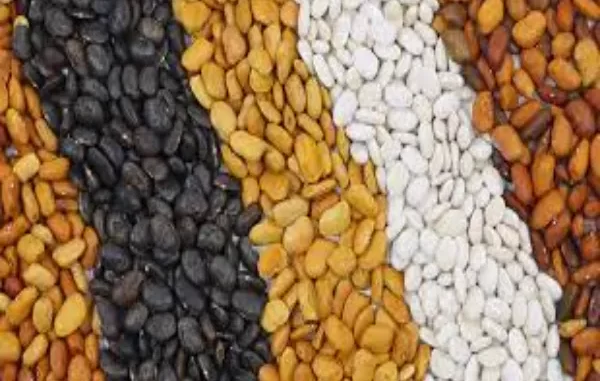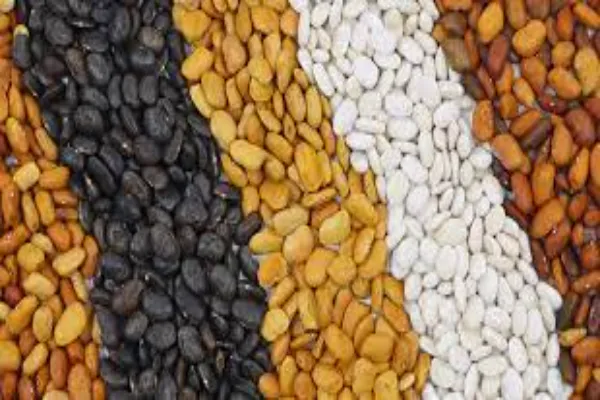
Welcome! Seeds are full of fascinating facts and fun tidbits. Did you know that a single apple tree can produce up to 15,000 apples in a single season? Or that some seeds can take up to a decade to sprout? This article will provide you with some fun facts about seeds—from the most unusual to the most incredible. So let’s get started!
“Discovering the Fascinating World of Seed Facts”
The world of seeds is a vast and fascinating one, and there are countless facts to explore. From the life cycle of the seed to the remarkable diversity of different types, these tiny structures are a source of incredible knowledge. To better understand the wonders of the seed, let’s delve into some of the more interesting facts about them.
The first fact to consider is that each seed is a tiny powerhouse of energy, containing the potential to become an entire plant. Inside the seed is an embryo, which is the first stage of a plant’s development. This embryo can remain dormant for years before the right conditions are available for it to begin growing.
Another incredible fact is that there are over 400,000 different species of seeds in the world. From the hardy wheat seed to the delicate orchid seed, the variety of seeds is astounding. Each species has its own unique characteristics, with some requiring specialized environments in order to germinate.
In addition to this, many species of seeds are capable of surviving extreme conditions. Some can even survive temperatures as low as minus 40 degrees Celsius and as high as 50 degrees Celsius. This is possible due to the protective outer layer of the seed, which helps to protect it from the elements.
Finally, it is important to note that all seeds have a limited lifespan. In most cases, seeds will only remain viable for up to five years. As such, it is important to store them in a cool and dry place to ensure their longevity.
These are just some of the many fascinating facts about seeds. Their incredible diversity, resilience, and potential are truly remarkable, and it is no wonder that they have been used by humans for centuries. With all the facts in mind, it is easy to understand why seeds have been so important and why they will continue to play a major role in the world.
“The Surprising Ways that Seeds Impact Our Lives”
Seeds are an integral part of nearly every aspect of our lives, though we may not be aware of it. From the food we eat to the clothes we wear, seeds play a crucial role in providing for our basic needs.
One major way that seeds affect our lives is through the food we consume. Almost all of the food we eat is derived from plants, which are grown from seeds. Common vegetables like corn, potatoes, and squash, as well as grains like wheat and rice, all come from seeds. Fruits, too, are grown from seeds. Even many of the meats we consume are produced using grains, which are grown from seeds.
Seeds are also used to produce fabrics for clothing. Cotton, one of the most commonly used fabrics in the world, is spun from the fiber of the cotton plant, which is grown from a seed. Hemp, flax, and other materials are also derived from plants grown from seeds.
Seeds are even used to produce a variety of products in the health and beauty sector. Many common health products contain ingredients like macadamia nuts, sunflower oil, and other plant-based ingredients that are grown from seeds. Similarly, many beauty products are derived from plants grown from seeds.
Finally, seeds are used to produce paper, fuel, and other everyday products. Paper is made from trees, which are grown from seeds, and fuel is often produced from plants like corn, which are grown from seeds.
In conclusion, seeds play an essential role in our lives. They are used to produce the food we eat, the fabrics we wear, and the products we use every day. Without seeds, many of the products and services we rely on would not be available.
“Uncovering the Mysteries of Incredible Seed Adaptations”
Seeds are fascinating little structures that have evolved over millions of years to help plants survive and propagate. From tiny mustard seeds to mighty coconuts, each species of seed has adapted to its environment in incredible ways. In this article, we will explore some of the most remarkable seed adaptations and uncover the mysteries of how plants have managed to survive and thrive in their environments.

One of the most impressive seed adaptations is the ability to resist dry and hot conditions. Many plants have developed highly impermeable seed coats which prevent water loss, allowing them to survive extended periods of drought. The seed coat of some species of cacti, for example, is so impermeable that it can remain viable for centuries.
Another remarkable adaptation is the ability of some seeds to disperse through long distances. Many species possess lightweight, winged seeds that can be carried away by the wind, allowing them to colonize far away areas. The Australian acacia, for instance, has highly aerodynamic seeds that can be carried away in the wind for up to 600 kilometers (373 miles).
Seeds have also adapted to using animals for dispersal. Some species, such as the coconut palm, produce large, heavy fruits that require animals to carry them away from the parent plant. Other species, such as the jackfruit, have developed sharp spines on their seed coats that allow them to attach to animal fur and be dispersed in this way.
Finally, some species have adapted to living in extreme conditions. Certain species of desert plants, for example, can remain dormant for years before emerging in response to flooding or other environmental changes. Plant seeds can also survive in extreme temperatures, such as those found in the Arctic and Antarctic, allowing them to colonize these regions.
The remarkable adaptations of seeds have allowed plants to survive and propagate in a variety of environments. From tiny mustard seeds to mighty coconuts, each species of seed has evolved to suit its environment in incredible ways. By uncovering the mysteries of how plants have managed to survive and thrive in their environments, we can gain a better appreciation for the incredible adaptations of seeds.
“The Amazing Benefits of Eating Seeds”
Seeds are a nutrient-dense food that offer a wide range of health benefits. They are packed with vitamins, minerals, essential fatty acids, and antioxidants, making them an excellent addition to any diet. Eating seeds can help to reduce inflammation, boost immunity, and improve cardiovascular health. Here are some of the amazing benefits of eating seeds.
- Seeds are an excellent source of antioxidants. Antioxidants help to protect the body from free radical damage, which can lead to chronic diseases such as cancer, heart disease, and diabetes. Eating a variety of seeds will provide the body with a range of antioxidants to help protect it from disease.
- Seeds are a great source of healthy fats. Many seeds are rich in essential fatty acids, such as omega-3 fatty acids, which are important for maintaining heart health. Eating seeds is a great way to increase your intake of healthy fats without consuming foods high in saturated fats.
- Seeds are packed with vitamins and minerals. Many seeds, such as hemp seeds, chia seeds, and flax seeds, are rich in vitamins and minerals such as vitamin E, magnesium, zinc, and iron. Eating a variety of seeds can help to ensure that you are getting enough of these essential nutrients.
- Seeds can help to reduce inflammation. Eating a diet rich in anti-inflammatory foods can help to reduce inflammation in the body, which can help to reduce the risk of chronic diseases. Eating seeds can help to reduce inflammation and keep the body healthy.
- Seeds can help to boost immunity. Seeds are packed with vitamins and minerals that can help to boost the immune system and keep the body healthy. Eating a variety of seeds can help to ensure that you are getting enough of these essential nutrients to help keep your immune system strong.
Overall, there are many amazing benefits to eating seeds. They are packed with vitamins, minerals, essential fatty acids, and antioxidants, making them an excellent addition to any diet. Eating a variety of seeds can help to reduce inflammation, boost immunity, and improve cardiovascular health.
“Exploring the Amazing Variety of Seeds Around the World”
Seeds are an integral part of the life cycle of many plants, and they come in a remarkable variety of shapes, sizes, and colors. From tiny mustard seeds to large coconuts, the world of seeds is an incredibly diverse one. In this article, we’ll explore the amazing variety of seeds found around the world.
One of the most common types of seed is the cereal grain. These small, round seeds are packed with nutrition and are a staple food in many cultures. Types of cereal grains include wheat, oats, barley, corn, rice, and rye.
Legumes are also a very common type of seed. These seeds come from plants in the Fabaceae family, which includes beans, lentils, peas, and peanuts. Legumes are incredibly versatile and are used in a wide variety of dishes, from soups and stews to salads and grain bowls.
Fruits are also a type of seed. The most common type of fruit seed is the stone fruit, which includes apricots, plums, peaches, and cherries. Stone fruits are full of flavor and are great for snacking or adding to recipes.
Nuts are another type of seed that can be found around the world. Some of the most popular types of nuts include walnuts, almonds, cashews, and pistachios. Nuts are packed with protein and healthy fats and are a great addition to many recipes.
Another type of seed is the oil seed. These seeds contain high levels of oil and are used to make a variety of products, including cooking oils, margarine, and biodiesel fuel. Types of oil seeds include soybeans, sunflowers, and canola.
Finally, there are the seeds of the tropical plants that grow in warm climates. These seeds come in a variety of shapes and sizes, from the smooth and shiny coconut seed to the spiky durian seed.
From cereal grains to tropical fruits, the world of seeds is an incredibly diverse one. Each type of seed has its own unique characteristics, flavors, and uses, making them an essential part of the global food supply.
Seeds are an amazing and diverse part of nature that can be used for many different purposes. From providing food to plants and animals, to providing a source of energy and nutrition for humans, seeds have been an important part of life since ancient times. Fun facts about seeds can help us to better appreciate the complexity and beauty of this remarkable part of the natural world. No matter how much we learn, there is always something new to discover about the amazing and varied world of seeds.






Leave a Reply